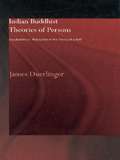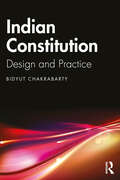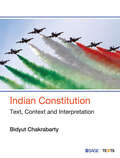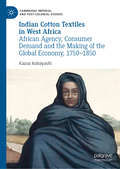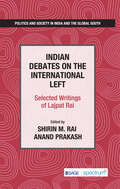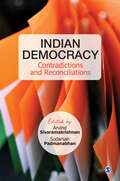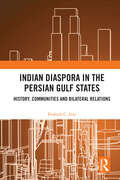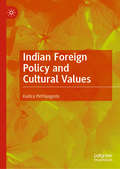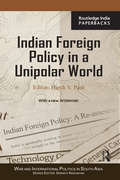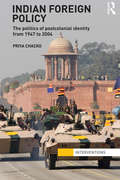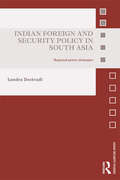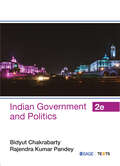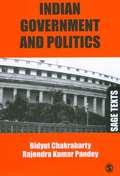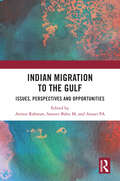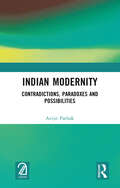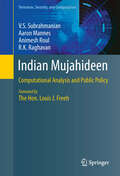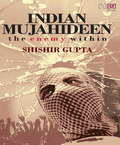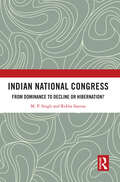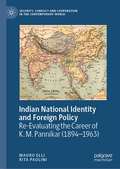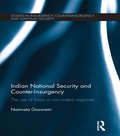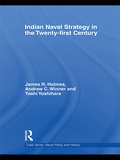- Table View
- List View
Indian Buddhist Theories of Persons: Vasubandhu's Refutation of the Theory of a Self (Routledge Critical Studies in Buddhism)
by James DuerlingerIn this book, Vasubandhu's classic work Refutation of the Theory of a Self is translated and provided with an introduction and commentary. The translation, the first into a modern Western language from the Sanskrit text, is intended for use by those who wish to begin a careful philosophical study of Indian Buddhist theories of persons. Special features of the introduction and commentary are their extensive explanations of the arguments for the theories of persons of Vasubandhu and the Pudgalavâdines, the Buddhist philosophers whose theory is the central target of Vasubandhu's refutation of the theory of a self.
Indian Constitution At Work class 11 - NCERT - 23 (Political Science)
by National Council of Educational Research and TrainingThe "INDIAN CONSTITUTION AT WORK" textbook in Political Science for Class XI by NCERT provides a comprehensive overview of the functioning of the Indian Constitution. It delves into the historical background, the making of the Constitution, and its philosophy. The book expounds on the salient features, including the Preamble, the Fundamental Rights, and the Directive Principles of State Policy. It demystifies the federal structure, the roles of the Executive, Judiciary, and Legislature, and the relationship between the Centre and the States. The textbook also touches upon the challenges the Constitution has faced, the amendments made, and the importance of institutions like the Election Commission and the Panchayati Raj. Through lucid explanations, illustrations, and real-life examples, it offers readers an insight into the dynamic nature of the Constitution and its significance in ensuring democracy, justice, and equality in India.
Indian Constitution First Semester FYBA New NEP Syllabus - SPPU
by Dr Pramod R. TambeThe book “Indian Constitution (Political Science)”, is a comprehensive exploration of the Indian Constitution as per the NEP syllabus for F.Y.B.A. (Semester I). It details the making of the Constitution, its historical evolution, and the functioning of the Constituent Assembly. The text includes discussions on fundamental aspects such as Fundamental Rights, Duties, and Directive Principles of State Policy, while also elaborating on the Preamble and salient features like democracy, secularism, and federalism. Additionally, it explains constitutional principles, amendments, and unique features like the parliamentary system and judicial independence, offering students an analytical understanding of India's constitutional framework.
Indian Constitution: Design and Practice
by Bidyut ChakrabartyThe book deals with the making and unfolding of the Constitution of India, framed by the Constituent Assembly between 1946 and 1949. Superseding the conventional legalistic approach, it focuses on the politico-ideological priorities of the members of Assembly who played a critical role in preparing the provisions of the Constitution.With its appeal cutting across academic specializations, this book stands out as a significant document by making readers aware of their constitutional rights and duties and the ways to utilize the constitutional directions for human and national betterment. Written in lucid language, this book is a great asset for those seeking to understand the complex ideas implicit in legally articulated provisions.Tailored to the academic requirements of a global readership, this volume would be useful to students, researchers and teachers working in the fields of Politics, Law, public administration and public policy. It would also be an invaluable resource for legal experts and policymakers.
Indian Constitution: Text, Context and Interpretation
by Bidyut ChakrabartyIt is important that we recognize the Indian Constitution not only as a legal or moral entity but also as a living organism, sustaining and consolidating our constitutional democracy. Indian Constitution: Text, Context and Interpretation presents an understanding of the Constitution in the context of the rapid changes arising out of indigenous and exogenous influences. It traces the evolution of the constitutional provisions, their core nature and manifestation with reference to the situational socio-economic circumstances in a globalizing world. This book stands apart from the other existing titles on the subject as it goes beyond the conventional mode of understanding the Constitution. It is both informative and intriguing as it deals with the actual constitutional provisions, and critically analyses the foundational values on which they rest. Key Features An analytical account of the processes leading to the making of the Constitution A thorough discussion of the core constitutional provisions Reinterpretation of the constitutional provisions in the light of multiple judicial pronouncements
Indian Cotton Textiles in West Africa: African Agency, Consumer Demand and the Making of the Global Economy, 1750–1850 (Cambridge Imperial and Post-Colonial Studies Series)
by Kazuo KobayashiThis book focuses on the significant role of West African consumers in the development of the global economy. It explores their demand for Indian cotton textiles and how their consumption shaped patterns of global trade, influencing economies and businesses from Western Europe to South Asia. In turn, the book examines how cotton textile production in southern India responded to this demand. Through this perspective of a south-south economic history, the study foregrounds African agency and considers the lasting impact on production and exports in South Asia. It also considers how European commercial and imperial expansion provided a complex web of networks, linking West African consumers and Indian weavers. Crucially, it demonstrates the emergence of the modern global economy.
Indian Debates on the International Left: Selected Writings of Lajpat Rai
by Shirin M. Rai Anand PrakashThis book traces the Indian Left's engagement with the international communist debates of the 1960s and 1970s, shedding new light on the fault lines within the Left as well as on its international solidarities. Lajpat Rai argued for rethinking established leftist positions, seeking inspiration in experiment and developing creative approaches for the sustainability of socialist ideas and ideals. The contemporary relevance of these debates is significant as the Left remains without a sharp response to the rise of neoliberalism and right-wing populism in India, and a failure of the Left to recognize the challenges emanating from a strongly integrated and organized finance capital on the one hand and the increasingly self-aware identity politics on the other. Democratic opposition rather than a bureaucratic thinking needs to be the backbone of any meaningful Left struggle. Lajpat Rai's passionate writing gives expression to the spirit and intensity of political debates at the time and the role of the Left intelligentsia in comprehending, from a committed socialist angle, the shifting paradigms of an unstable world to help bring about progressive change.
Indian Democracy: Contradictions and Reconciliations
by Arvind Sivaramakrishnan and Sudarsan PadmanabhanIndian Democracy: Contradictions and Reconciliations provides a vivid presentation of major facets of democracy in India. It aims to explore how Indian democracy has functioned, with reference to its theoretical foundations, institutional mechanisms and procedures, and political practices. The book starts with a close analysis of the Constitution of India, which provides the theoretical validation for democratic politics and serves as a reflective and regulative ideal. It highlights the way adherence to democratic principles and nurturing of strong institutions have helped India negotiate and often reconcile contradictions such as caste inequalities, linguistic and ethnic identities, majority–minority divide, gender bias and divergences in the conception of democracy itself. Furthermore, the book delineates significant improvements in the maintenance of accurate electoral registers, enforcement of the Model Code of Conduct and use of electronic voting machines, considerable reductions in violence and intimidation in the recent decades, which have together contributed to strengthening the Indian voter’s confidence in democratic processes. This edited book will prove indispensable for all those who are interested in a close understanding of democracy in India.
Indian Diaspora in the Persian Gulf States: History, Communities and Bilateral Relations
by Prakash C. JainIndian Diaspora in the Persian Gulf States focuses on the historical as well as the contemporary aspects of the Indian diaspora of the region where small Indian merchant communities called Banians already existed for centuries. Persian Gulf countries emerged as rentier states since the 1970s, mainly due to the development of the oil industry, which transformed the region from subsistence to globalized capitalist economies. In these economies, the role of sponsored Indian expatriate immigrants numbering at least 20 million during the past half century was vitally important. Taking the rentier state as the theoretical perspective, the author argues that the sponsorship (kafala) system tended to have a different impact on the Indian expatriates: incorporation and promotion of the entrepreneurs and professionals as business elites and the perpetual exploitation of the working classes. The book is not only the first-ever definitive and comprehensive work on the Indian diaspora in the nine countries of the Gulf region, it also stands as the author’s final statement on his three-odd decades of research and writing on the subject. Besides highlighting the role of Indian diaspora, the book also profiles all the Gulf-based recipients of the Pravasi Bharatiya Samman Awards. Bilateral trade, investment and political relations between India and individual Persian Gulf states constitute another focus area of the volume. The volume will be an interesting read for teachers, researchers and policy-makers connected with migration and diaspora studies, labour studies, political economy, international relations and geopolitics.
Indian Economy - 2nd Edition - Competitive Exam: A complete guide on the concepts of Indian Economy for UPSC, CSE and State PCS Examinations
by Study IQ Education Pvt. Ltd.The second edition of Indian Economy by Study IQ Publications is a comprehensive guide designed to address the Indian Economy syllabus for UPSC Civil Services and State PCS examinations. Structured to cover both prelims and mains, particularly GS Paper III (Economic Development), the book provides in-depth insights into key economic concepts, policies, and trends. Topics include macroeconomic indicators, agricultural and industrial development, fiscal and monetary policies, and financial markets. Additionally, it emphasizes inclusive growth, sustainable development, and the interplay between different sectors like agriculture, industry, and services. Supported by updated data, budgetary insights, infographics, and previous years' questions, this resource aids aspirants in conceptual clarity and application. The inclusion of economic surveys and policy updates ensures that candidates are well-prepared for competitive exams.
Indian Express [Fri, 24 Nov 2017]
by Indian ExpressArticles in this issue: Muslim cleric, his two relatives beaten up in train in UP: FIR Durga principal Goddess…court over-reaching: I&B tells Kerala High Court Like Congress, like BJP: Nine prime acres for a song — this time for Gita Research Centre
Indian Foreign Policy and Cultural Values
by Kadira PethiyagodaAs India rises to great power status in the emerging multipolar world order, what influence will its rich and ancient culture have on the country’s foreign policy? This book reveals that cultural values have greater explanatory power than previously thought and describes the nature of their influence. Excavating thousands of years of history, the monograph identifies enduring values that are relevant to contemporary foreign policy. It examines three critical areas of Indian foreign policy – nuclear policy, humanitarian intervention and relations with the Middle East. Major decisions were shaped by cultural values – sometimes at the expense of strategic interests. India’s choice to test nuclear weapons was not purely because of China or Pakistan: hierarchy also played a role. From a hierarchical worldview shaping Delhi’s approach to international law on arms control to pluralism facilitating simultaneous friendships with America and Iran, values thread their way throughout India’s foreign relations. Non-violence underpins Delhi’s soft power in both the West and the Middle East, while having spurred India’s opposition to Western intervention in Iraq. Analyzing state behavior and interviewing diplomats, the book charts culture’s evolving influence from Rajiv Gandhi to Narendra Modi.
Indian Foreign Policy in a Unipolar World (War And International Politics In South Asia Ser.)
by Harsh V. PantIndia's foreign policy, out of the structural confines of the Cold War strategic framework, has become more expansive in defining its priorities over the last few years. With the rise of its economic and military capabilities and strategic interests, India has shaped a diplomacy that is much more aggressive in the pursuit of those interests. Tracing the trajectory of India's foreign policy in the 21st century, this book examines the factors that have shaped the Indian response towards this emerging international security environment. Including a new Afterword, this updated volume looks at the major influences that have shaped India's foreign policy in recent years, in the context of its engagements with strategically important regions across the globe, and its relations with major global powers.The volume will prove invaluable to those studying politics and international relations, diplomatic and political history, defence and military studies, and South Asian studies.
Indian Foreign Policy: The Politics of Postcolonial Identity from 1947 to 2004 (Interventions)
by Priya ChackoThe rise of India as a major power has generated new interest in understanding the drivers of its foreign policy. This book argues that analysing India’s foreign and security policies as representational practices which produce India’s identity as a postcolonial nation-state helps to illuminate the conditions of possibility in which foreign policy is made. Spanning the period between 1947 and 2004, the book focuses on key moments of crisis, such as the India-China war in 1962 and the nuclear tests of 1972 and 1998, and the approach to international affairs of significant leaders like Jawaharlal Nehru. The analysis sheds new light on these key events and figures and develops a strong analytical narrative around India’s foreign policy behaviour, based on an understanding of its postcolonial identity. It is argued that a prominent facet of India’s identity is a perception that it is a civilizational-state which brings to international affairs a tradition of morality and ethical conduct derived from its civilizational heritage and the experience of its anti-colonial struggle. This notion of ‘civilizational exceptionalism’, as well as other narratives of India’s civilizational past, such as its vulnerability to invasion and conquest, have shaped the foreign policies of governments of various political hues and continue to influence a rising India.
Indian Foreign and Security Policy in South Asia: Regional Power Strategies (Asian Security Studies)
by Sandra DestradiThis book examines Indian foreign policy and security relations in its eastern regional neighbourhood. Indian Foreign and Security Policy in South Asia conducts an in-depth analysis into India’s foreign policy towards the three main countries in India’s Eastern neighbourhood – Sri Lanka, Nepal, and Bangladesh. In particular, it deals with India’s role in the final years of the civil war in Sri Lanka, its approach to the peace and democratisation process in Nepal, and Indian foreign policy towards Bangladesh on a range of issues including Islamist militancy, migration, border security, and insurgency. Set within an analytical framework centred on the notions of ‘empire’, ‘hegemony’, and ‘leadership’, the study reveals that India pursued predominantly hegemonic strategies and was not able to generate genuine followership among its smaller neighbours. The South Asian case therefore shows the discrepancy that may exist between the possession of power capabilities and the ability to exercise actual influence: a conclusion which lifts the study from geographical specifics, and extends its relevance to other cases and cross-regional comparisons. This text will be of much interest to students of Indian foreign policy, Asian security, foreign policy analysis, strategic studies and IR in general.
Indian Government and Politics
by Bidyut Chakrabarty Rajendra Kumar PandeyThis revised edition of the bestselling textbook explains the development, activities and complexities of Indian government and politics and its contemporary aspects. Adopting a multi-disciplinary approach, Indian Government and Politics, 2e, offers a refreshingly creative interpretation of foundational ideas, key institutions, democratic processes and states' responses to public aspirations. It unearths new areas of inquiry by posing pertinent questions on the nature of Indian politics and functioning of the government. The book studies how the political institutions have emerged and changed since the end of the colonial rule in the country. Its strength lies in its focused content and analytical rigour that help readers to critically engage with the political happenings in India. This edition will continue to serve as a standard textbook for UG and PG students of political science and public administration. It will also act as an incisive manual for UPSC and civil service aspirants. Key Features: • Continues to help build a solid theoretical--conceptual foundation on the nature and texture of Indian politics • Thoroughly updated and revised chapters to reflect recent developments in Indian politics • Six additional chapters on the nature of Indian state, fundamental rights and directive principles of state policy, public services, electoral process, corruption and machinery for redressal of public grievances and social movements • Introduction of pedagogical features such as Did You Know boxes, brief bio-notes of eminent writers of Indian politics and mid-chapter exercises to aid self-learning and assessment
Indian Government and Politics: Competitive Exam
by Bidyut Chakrabarty Rajendra Kumar PandeyIndian Government and Politics will serve as a standard textbook for undergraduate students of Political Science and Public Administration. It is also an incisive manual for the candidates appearing for various UPSC and civil service examinations, besides being invaluable for students and researchers of political science in general, and post-colonial contemporary Indian politics in particular. The book explains the complexities of the Indian political process and its effects on the constitutional institutions of India. Adopting a multi-disciplinary approach, it takes a fresh look at the socio-political and economic scenario of contemporary India and unearths new areas of inquiry by posing pertinent questions on the nature of Indian politics. The strength of the book lies in its focused content, which thoroughly analyses the political happenings in India and studies how the political institutions have emerged and changed since the end of colonial rule in the country.
Indian Migration to the Gulf: Issues, Perspectives and Opportunities
by Anisur Rahman, Sameer Babu M, and Ansari P AThis book explores issues of rights, issues, and challenges faced by Indian migrant workers in the GCC countries. It focuses on the struggle of migrants in the state of origin and destination states and how the process of migration shapes the identity and existence of migrant workers. The essays in the volume focus on policy, rights, issues, and challenges faced by migrants as well as the long-term challenges posed by the COVID-19 pandemic. With contributions from academics and policymakers, this book will be of interest to scholars and researchers of migration and diaspora studies, public policy, and South Asian Studies.
Indian Modernity: Contradictions, Paradoxes and Possibilities
by Avijit PathakIndian Modernity (first published in 1998) acquires a new meaning today. While it critiques a techno-militaristic model of modernization, it visualizes alternative possibilities to give a distinctively new definition to our modernity. It engages the reader in dreaming of a new path to modernity beyond its present contradictions and paradoxes with its lyrical style, philosophic insights, sensitivity to deep religiosity, life-affirming femininity and, most of all, sociological imagination. This book continues to hold relevance for social science students and researchers, teachers, and visionaries, despite the passage of time. This title is co-published with Aakar Books. Print editions not for sale in South Asia (India, Sri Lanka, Nepal, Bangladesh, Pakistan and Bhutan)
Indian Mujahideen
by V. S. Subrahmanian Aaron Mannes Animesh Roul R. K. RaghavanAdvance Praise for Indian Mujahideen: Computational Analysis and Public Policy "This book presents a highly innovative computational approach to analyzing the strategic behavior of terrorist groups and formulating counter-terrorism policies. It would be very useful for international security analysts and policymakers. " Uzi Arad, National Security Advisor to the Prime Minister of Israel and Head, Israel National Security Council (2009-2011) "An important book on a complex security problem. Issues have been analysed in depth based on quality research. Insightful and well-balanced in describing the way forward. " Naresh Chandra, Indian Ambassador to the USA (1996-2001) and Cabinet Secretary (1990-1992). "An objective and clinical account of the origins, aims, extra-territorial links and modus-operandi, of a growingly dangerous terrorist organization that challenges the federal, democratic, secular and pluralistic ethos of India's polity. The authors have meticulously researched and analysed the multi-faceted challenges that the "Indian Mujahideen" poses and realistically dwelt on the ways in which these challenges could be faced and overcome. " G. Parthasarathy, High Commissioner of India to Australia (1995-1998) and Pakistan (1998-2000). This book provides the first in-depth look at how advanced mathematics and modern computing technology can influence insights on analysis and policies directed at the Indian Mujahideen (IM) terrorist group. The book also summarizes how the IM group is committed to the destabilization of India by leveraging links with other terror groups such as Lashkar-e-Taiba, and through support from the Pakistani Government and Pakistan's intelligence service. Foreword by The Hon. Louis J. Freeh.
Indian Mujahideen
by Shishir GuptaRecent acts of terror have exploded the myth that Indian youth is insulated from the global terrorism phenomenon and had little time for extremism. The communal riots post the 1992 incident, the rise of the Students Islamic Movement of India (SIMI) and the mutation of a section of aspiring Muslim youth into terrorists with the help of forces across the border. The story of home-grown jihadists would have been skewed had it not been for the testimonies of David Coleman Headley and Sarfaraz Nawaz on the involvement of the Pakistan Inter-Services Intelligence, top Lashkar-e-Taiba leadership, the Al Qaida and the Karachi project, whose demon child the Indian Mujahideen is. This book is the first-ever attempt to link up jihadists all over India and trace their linkages with terrorists based in countries like Pakistan, Nepal, Sri Lanka, Bangladesh, United Arab Emirates, Oman, Yemen and Saudi Arabia.
Indian National Congress: From Dominance to Decline or Hibernation?
by Rekha Saxena M. P. SinghThis book presents a systematic analysis of the rise and decline of the Indian National Congress since 1980s, using the frame dominance to hibernation. The Indian National Congress (INC or Congress Party) originated in the national movement for India`s freedom and has since been the centerpiece of post-Independence multiparty system for nearly four decades. However, the Congress has been experiencing a phase of serious decline since the 2014 and 2019 General Elections. Analyzing years of political history and contemporary developments, this volume brings to the fore important issues and key themes such as, • Evolution of party system in India, the contemporary dynamics and movements; • Indian National Congress under Indira Gandhi and Rajiv Gandhi; • Ideological and policy reorientation of the party in 1990s under P. V. Narsimha Rao; • Revival of mass membership and organizational elections in the party; • Indian National Congress in the 2000s, under the leadership of Sonia Gandhi and Rahul Gandhi; • The 2019 debacle and change in the leadership. A comprehensive work on the history of the Congress Party in India, this volume will be an essential read for scholars and researchers of political science, party politics, Indian politics, sociology, modern Indian history, political sociology, public administration, public policy, South Asian studies, and governance studies.
Indian National Identity and Foreign Policy: Re-Evaluating the Career of K. M. Pannikar (1894–1963) (Security, Conflict and Cooperation in the Contemporary World)
by Mauro Elli Rita PaoliniShedding light on the role of India within twentieth-century international relations, this book explores the life and career of Kavalam Madhava (K. M.) Panikkar (1894–1963), an Indian historian, statesman and diplomat. Having been involved in Indian intellectual and political life throughout the transition from the British Empire to the Nehruvian era, Panikkar was an important figure in the evolution of the modern Indian state. Based on over four years of extensive research both in India and Europe, and the analysis of public writings and unpublished archival documents, this book examines Panikkar’s role in the Indian national movement, the governance of several Princely states, and India’s foreign policy, notably with China. Not only do the authors critically re-evaluate Panikkar’s intellectual and political thoughts, but also his influence on the broader issue of India’s path towards independence. Offering a valuable contribution to modern Indian diplomatic history and wider international relations, this comprehensive book emphasises Panikkar’s importance in shaping the modern idea of India and crucial elements of Indian foreign policy.
Indian National Security and Counter-Insurgency: The use of force vs non-violent response (Studies in Insurgency, Counterinsurgency and National Security)
by Namrata GoswamiThis book, based on extensive field research, examines the Indian state’s response to the multiple insurgencies that have occurred since independence in 1947. In reacting to these various insurgencies, the Indian state has employed a combined approach of force, dialogue, accommodation of ethnic and minority aspirations and, overtime, the state has established a tradition of negotiation with armed ethnic groups in order to bolster its legitimacy based on an accommodative posture. While these efforts have succeeded in resolving the Mizo insurgency, it has only incited levels of violence with regard to others. Within this backdrop of ongoing Indian counter-insurgency, this study provides a set of conditions responsible for the groundswell of insurgencies in India, and some recommendations to better formulate India’s national security policy with regard to its counter-insurgency responses. The study focuses on the national institutions responsible for formulating India’s national security policy dealing with counter-insurgency – such as the Prime Minister’s Office, the Cabinet Committee on Security, the National Security Council, the Ministry of Home Affairs and the Indian military apparatus. Furthermore, it studies how national interests and values influence the formulation of this policy; and the overall success and/or failure of the policy to deal with armed insurgent movements. Notably, the study traces the ideational influence of Kautilya and Gandhi in India’s overall response to insurgencies. Multiple cases of armed ethnic insurgencies in Assam, Manipur, Mizoram, and Nagaland in the Northeast of India and the ideologically oriented Maoist or Naxalite insurgency affecting the heartland of India are analysed in-depth to evaluate the Indian counter-insurgency experience. This book will be of much interest to students of counter-insurgency, Asian politics, ethnic conflict, and security studies in general.
Indian Naval Strategy in the Twenty-first Century (Cass Series: Naval Policy and History)
by James R. Holmes Toshi Yoshihara Andrew C. WinnerThis is the first academic study of India's emerging maritime strategy, and offers a systematic analysis of the interplay between Western military thought and Indian maritime traditions. By a quirk of historical fate, Europe embarked on its Age of Discovery just as the main Asian powers were renouncing the sea, ushering in centuries of Western dominance. In the 21st century, however, Asian states are once again resuming a naval focus, with both China and India dedicating some of their new-found wealth to building powerful navies and coast guards, and drawing up maritime strategies to govern the use of these forces. The United States, like the British Empire before it, is attempting to manage these rising sea powers while preserving its maritime primacy. This book probes how India looks at the sea, what kind of strategy and seagoing forces New Delhi may craft in the coming years, and how Indian leaders may use these forces. It examines the material dimension, but its major premise is that navies represent a physical expression of a society's history, philosophical traditions, and culture. This book, then, ventures a comprehensive appraisal of Indian maritime strategy. This book will be of interest to students of sea power, strategic studies, Indian politics and Asian Studies in general. James R. Holmes is an Associate Professor of Strategy at the U.S. Naval War College and a former U.S. Navy surface warfare officer. Toshi Yoshihara is an Associate Professor in the Strategy and Policy Department at the Naval War College. Andrew C. Winner is Professor in the Strategic Research Department at the U.S. Naval War College.
